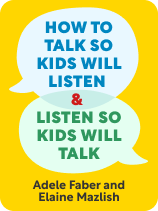

This article is an excerpt from the Shortform book guide to "How to Talk So Kids Will Listen & Listen So Kids Will Talk" by Adele Faber and Elaine Mazlish. Shortform has the world's best summaries and analyses of books you should be reading.
Like this article? Sign up for a free trial here.
Wondering how to praise your child using words? What do experts recommend when it comes to delivering effective praise to children?
Adele Faber and Elaine Mazlish believe the key to success is teaching kids a communication style that helps them be empathetic and responsible throughout their lives. In their bestselling book How to Talk So Kids Will Listen & Listen So Kids Will Talk, they explain how to praise your child using descriptive, empowering words.
Read on to learn how to praise your child with words, according to Faber and Mazlish’s advice.
Praising Your Child With Words
In How to Talk So Kids Will Listen & Listen So Kids Will Talk, educators Adele Faber and Elaine Mazlish explain how to praise your child in order to most effectively communicate with them, claiming that giving empowering praise is a great place to start. They emphasize the importance of praise for several reasons. First, praising your child is something proactive that parents can do any time. It ensures you’re communicating not just about problems that need to be addressed, but also about what you’re proud of. Finally, it’s a powerful way to encourage positive behavior.
To deliver effective praise, though, Faber and Mazlish say you must first understand what not to do when delivering praise. As they learned from the child psychologist Haim Ginott, praise is like emotional medicine and should be administered carefully and intentionally. When your children ask you if their scribbled drawing is “good,” you may reply, “Yes! It’s great!” But this kind of praise doesn’t sound authentic to kids, because it’s too vague and doesn’t show that you’re paying attention and appreciating what they’ve done, according to the authors.
Now, here’s what Faber and Mazlish recommend instead.
Use Descriptive Praise
The authors recommend descriptive praise, which means specifically and enthusiastically describing what you see in their drawing, such as the shapes and colors. Your children will appreciate that you’re paying attention. Descriptive praise also makes children aware of their strengths and builds their self-esteem. They can then praise themselves.
For example, if you compliment a child specifically for how neatly they made their bed or how imaginatively they completed a writing assignment, they might chime in, “Yeah! See how I folded down the top of the blanket? I was being really careful,” or “I really thought about what would happen if hippos went into space!” When they understand what was praiseworthy about their actions, they’ll be better able to repeat those actions in the future.
(Shortform note: Vague praise, which Faber and Mazlish caution against, like “It looks great!” or “Good job!” is called evaluative praise, meaning it focuses on the parents’ judgment of the child. Even when that judgment is positive, the child knows that the parent is only praising them because they feel obligated to, not because they’ve appreciated the specifics of the child’s accomplishments. Studies have shown that descriptive praise is far more effective in helping children establish a growth mindset, or the confidence that they can learn and improve.)
Find a Positive Label
In addition to specifically describing the positives when you praise your child, Faber and Mazlish say you should give your child the language for the qualities you’d like to see them develop. For example, notice when a child is trying hard to complete a task, and tell them they’re really showing perseverance, determination, or working hard. If they stand by a friend who’s being teased, tell them they showed friendship, loyalty, or courage.
| How Much Praise Is Enough? Faber and Mazlish emphasize the importance of frequent, specific praise, but how frequent is enough? Experts recommend that parents say 10 positive things to their children for every negative response. In other words, when they’re behaving well, compliment them! A pediatrics professor writing in Parents magazine says you should catch them being good. To help follow Faber and Mazlish’s advice about finding a positive label for your child’s behavior, experts also urge parents to praise a child’s efforts rather than focusing on the outcome. If a child receives positive feedback for trying hard, they’re more likely to persevere when something is difficult. “Gentle parenting” advocate Ockwell-Smith recommends only praising children for things that are within their control. |
Faber and Mazlish explain that praising your children proactively shows children that you see their good points as well as their flaws. It makes them more receptive to you during more difficult times when they’re experiencing negative emotions. Dealing empathetically with these negative feelings is the focus of the next section.
| The Downside of Praise Contrary to Faber and Mazlish’s approach of frequent praise, Alfie Kohn cautions in his 2005 book Unconditional Parenting that praise can make children feel they have to behave a certain way to win their parents’ love. When parents praise their children, Kohn argues, the children don’t hear an unconditional “I love you.” They hear “I love you because…”—perhaps because they got good grades or behaved well at school. Kohn says praise is more about what parents feel like they need to say to be supportive than about what kids need to hear. Instead of praising your children, Kohn recommends giving them plenty of affection and attention, even when they’re being difficult, and letting them know you’re always happy to be with them no matter what’s going on. You can say something free of any evaluations to let your child know you saw them succeed—for example, you might say, “You did it,” to a child who was struggling to turn on a toy and finally figured it out. However Kohn, like Dr. Laura Markham, the author of the 2012 book Peaceful Parent, Happy Kids: How to Stop Yelling and Start Connecting, adds that you can draw attention to how their actions helped others. That gives children a motivation to be generous besides just making you happy. |

———End of Preview———
Like what you just read? Read the rest of the world's best book summary and analysis of Adele Faber and Elaine Mazlish's "How to Talk So Kids Will Listen & Listen So Kids Will Talk" at Shortform.
Here's what you'll find in our full How to Talk So Kids Will Listen & Listen So Kids Will Talk summary:
- How to build mutually respectful relationships with your children
- How to make your children feel heard and understood
- Methods for effectively praising and scolding your children






